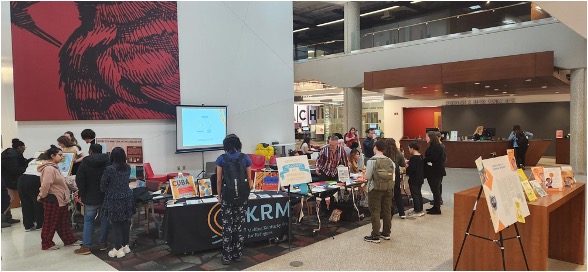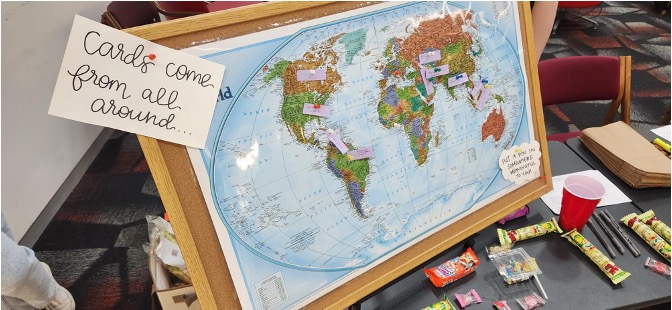Abigail Anderson, Writing Consultant
Last Wednesday, February 21st, the University Writing Center hosted our annual celebration of International Mother Language Day. Recognized by the United Nations, International Mother Language Day honors linguistic and cultural diversity around the world and highlights the importance of multilingual education. According to UNESCO, “globally 40 per cent of the population does not have access to an education in a language they speak or understand,” so the topic of language education becomes increasingly relevant to our modern world. As a result, the goal of our event was to celebrate the myriad languages spoken on campus and in our wider Louisville community, and to provide resources, activities, and opportunities to learn about one of the most vital cultural tools at our disposal: language.
In planning this event, one of our administrators, Kylee, and I were very lucky to work with a number of different organizations, programs, and community members. Our collaborators included Kentucky Refugee Ministries, Professor Ming Wu from the department of Classical and Modern Languages, Tzuhan Tung, Yuan Zhao, Professor Gerard Willinger from the Physics department, Professor Csaba Biro from the Mathematics department, and Omar Sadi Sarkar and the members of the Bangladeshi Student Association. We were so thankful to have these partners in this event, as well as help from my fellow consultants Jameson Reid, Jennings Collins, Jolie Finley, and Caden Holbrook.
Held in the Learning Commons of the Ekstrom Library, this year’s International Mother Language Day celebration was a great success. Though the heightened visibility of being in a public space undeniably helped to attract passers-by to our tables, I credit so much of the event’s success to the dedication of the faculty, students, and organizations who collaborated with us. Because of the amazing materials, activities, and resources they brought to the table, as well as their own knowledge and enthusiasm, there was an infectious, inquisitive energy to the space that drew so many students and faculty in.
In addition to providing language resources, curious event-goers also had the opportunity to learn about the history of International Mother Language Day. As the Bangladeshi Student Association shared at their table, International Mother Language Day began as Language Martyrs Day in Bangladesh, formerly East Pakistan. This holiday commemorates protestors who were killed at the University of Dhaka on February 21, 1952 during ongoing political rallies against the Pakistani government’s decision to remove Bangla, one of the most common languages spoken in the region, as one of Pakistan’s national languages. First recognized by the UN in 1999 and celebrated as an international holiday since 2000, the origins of International Mother Language Day undoubtedly illustrate the importance of the right to speak one’s mother language and have that language be respected and valued in one’s community.
Indeed, throughout all of the other tables in this event, attendees could engage in authentic experiences of multilingual education or outreach, highlighting a sampling of our diverse community on campus and in the city of Louisville more broadly. Attendees had the opportunity to write letters or make cards for incoming refugees with Kentucky Refugee Ministries, and learn more about the work they do to help refugees in Louisville. They could also engage in activities curated by UofL faculty: learning to write Chinese characters, and sampling a selection of Hungarian books, art, and music. In the process of planning and hosting this event, it was heart-warming for me to see the excitement present in both our multilingual presenters and our event-goers, students, faculty, and community members alike, who showed an eagerness to learn, try new things, and engage authentically with others around them.
I personally worked at the table where attendees would ideally start their International Mother Language Day journey. As a starting place, I fielded the questions of, “What is all this?” or “What are you all doing?” or “Is this candy free to take?” With every inquisitive look from someone just passing through, I hoped they would stick around to see more of what we had to offer, and what our hosts had taken such care to prepare.
At my table also sat a bulletin board with a map of the world on it, onto which people could place a pin and note to indicate somewhere meaningful to them. Some students marked places they had traveled or studied abroad, while others marked their home countries. On the pieces of paper, many attendees also wrote small greetings or messages in their mother languages, which created beautiful moments of connection in the moments where people saw themselves or their language already represented on the map. The tactile and visual nature of this activity was meaningful for me as a host because it was a physical manifestation of how global UofL’s campus community truly is.
Understanding the importance of International Mother Language Day and seeing the impacts of multilingual education in action underscore the importance of prioritizing linguistic diversity in academic settings. Certainly, language is one of the most important tools we possess, and not simply in terms of communication; I sincerely hope that, for our attendees, this event invited them to think about language as a tool for conveying culture, traditions, and history in uniquely valuable ways. For me, it also emphasized the importance of valuing multilingualism in specifically our writing center practices. At the start of our event, I struck up a conversation with some students passing by. After I had described some of our offerings, one of the students told me, “I can’t stay because I have to run to class, but I really hope you all do this next year!” Though we may only host this event once a year, it is my hope that we can make the commitment to incorporating more multilingual elements into our pedagogies, to show that this appreciation for other languages and cultures is not simply a once-a-year occurrence.






